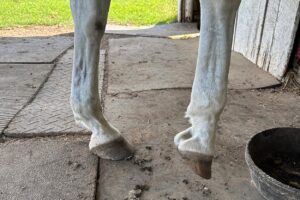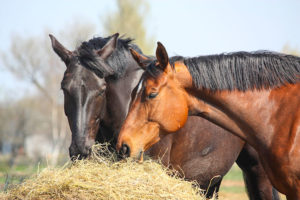Latest News – The Horse

Rationing Hay for Horses With Metabolic Problems
Sourcing lower-energy hay and implementing slow-feeding strategies can help reduce your horse’s risk of becoming obese and developing metabolic problems.

Wisconsin Quarter Horse Tests Positive for Strangles
The horse lives in Pierce County.

Post-Foaling Red Flags
Watch for these 10 emergencies in the hours after a mare foals. Immediate action could potentially save the mare’s and/or foal’s life.

Virginia Mare Tests Positive for Strangles
The mare lives in Fauquier County.

Virginia Horse Tests Positive for EHV-4
The horse lives in Fauquier County.

Strangles Case Confirmed in Michigan
The horse lives in Clinton County.

16 Saskatchewan Horses Test Positive for EIA
The cases of equine infectious anemia are located in Meadow Lake No. 588.

52 Florida Horses Confirmed Positive for CEM
The contagious equine metritis cases are located in Orange County.

The Abscess Ruptured, But My Horse is Still Lame. Now What?
Follow these steps when your horse has an abscess that lingers beyond typical treatment times. Read more in the Spring 2025 issue of The Horse.

Vitamin E Supplementation for Horses
Horses need the essential nutrient vitamin E for proper muscle and cell function. Here’s how you can be sure you’re meeting their requirements.

2 EHV-1 Cases Confirmed in Ontario
The horses lived in the Regional Municipality of Niagara and were euthanized.

2 Ontario Horses Test Positive for Strangles
The horses live in Grey and Dufferin counties.

Fifth EHV-1 Case Confirmed at Pennsylvania Boarding Facility
A fifth horse has tested positive for EHV-1 at a boarding facility in Montgomery County.

Understanding Jamestown Canyon Virus in Horses
Although horses have long been exposed to the virus, its rare detection in a Pennsylvania horse is not currently a reason for concern.

Will Whey Protein Improve My Horse’s Topline?
An equine nutrition expert addresses toplines, horse protein needs, and if whey is the way to go.

Can My Horse Eat Hay with Preservatives?
Although researchers have shown horses prefer untreated hay, it is safe for horses to eat hay treated with preservatives. An equine nutritionist explains why.











